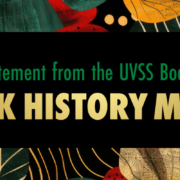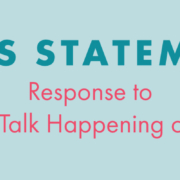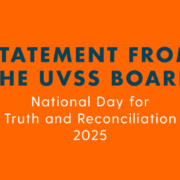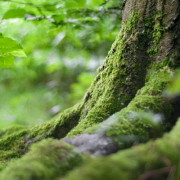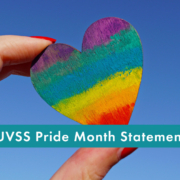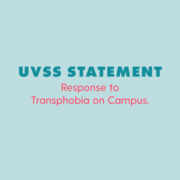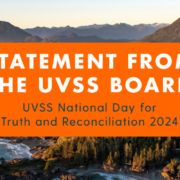Black History Month 2026 Statement
February is Black History Month. During this time, we recognize, acknowledge, respect, and educate ourselves about the contributions and achievements of Black Canadians. We also take this time to reflect on the injustices carried out against Black Canadians, singularly as a result of their race.
Announced by the government of Canada, this year’s theme is “30 Years of Black History Month: Honouring Black Brilliance Across Generations — From Nation Builders to Tomorrow’s Visionaries.” This theme resonates very strongly with us and speaks to values we at the UVSS seek to uphold. Though Black History Month has only been officially recognized in Canada for 30 years, the contributions of Black Canadians to Canada greatly surpasses these three decades.
As students at the University of Victoria, this theme is especially poignant to us – we work alongside future leaders every day. We see the amazing work done by Black students, despite the systematic marginalization they often experience. Through Black History Month and beyond, we must work to amplify Black voices and experiences. Amazing groups like the Students of Colour Collective (SOCC) work tirelessly to further the interests of Black students across our campus. We encourage all students, BIPOC or not, to engage with and support the work that they do.
Despite ingrained systemic barriers that Black students face, Black students continue to excel and push the boundaries of education at UVic. In our university and beyond, Black students continue to succeed and set the standard in often discriminatory spaces where they are made to feel unwelcome.
It’s our job to educate ourselves on this important history, and to continue pursuing justice and recognition for Black Canadians. It is our obligation as the voices of the UVSS to promote and share the importance of Black History Month. We aim to empower our Black students to find joy and celebration in community, and hope that our non-Black students take responsibility to learn from and engage meaningfully with Black history.
Whether it’s by supporting local Black businesses, taking the time to learn about important Black Canadians who helped shape this country, or by attending events put on at UVic and throughout the community, take some time to reflect on Black History month and the impacts the Black community have made. We encourage you to check out the resources below, which feature local events and educational materials, and to look at your own community for ways you can engage with Black History Month.
Resources:
Here are some upcoming events you can check out this Black History Month.
UVSS Events
Feb 2 – 6: Global Village
Global Village invites vendors, community organizations, and cultural ambassadors to bring cultures from around the world to life at UVic and is hosted by the Students of Colour Collective and the University of Victoria Students’ Society.
Before the Rain Falls immersive exhibition
Feb 4 & 5, 11am to 4pm, in the SUB Upper Lounge. Come and experience art, reflect and engage in discussions of migration, heritage, identity, memory and home with 5 student artist pieces.
Between Places, Between Belonging: A Panel
Feb 4 from 2-4 p.m. in the SUB Upper Lounge
More than a seat at the table: Amplifying BIPOC Voices: Panel
Feb 6 from 2-4 p.m. in the SUB Upper Lounge, featuring research from Gabrielle Warrior, UVic alumni and member of Scarborough Charter Steering Committee.
UVic events – 2026
Visit the Black History Month at UVic page for more details.
Feb 3 – Black History Month Panel – Faculty of Law
12:30 – 1:50 p.m. in Fraser B261
Join UVic Law’s Racial Justice Program for a panel discussion moderated by Assistant Professor of Law Andrew Luesley. The panel will explore the diversity of Black experiences in Canada, with attention to history, community, and institutional life.
Feb. 5 – Celebrate Black History Month with Food
11 a.m. – 2 p.m.
Come enjoy an African and Caribbean inspired meal at The Cove (Feast)! Offered by University Food Services in partnership with the Scarborough Charter Steering Committee.
Feb. 6 – African Beading Workshop
10 a.m. – 12 p.m. at the Student Life Hub (next to Mystic Market, Jamie Cassels Centre)
Learn about African beadwork traditions and create your own waist beads at this hands-on cultural celebration of African heritage.
Feb. 6 – Afro Beats night
6:00 p.m. at Vertigo, Student Union Building
This all ages event is presented by the Students of Colour Cooperative (SOCC).
Feb. 10 – Black Diaspora, Intellectual Life and the Current Academic Landscape
2:30 – 4:00 p.m. in the Engineering Computer Science Building, room 123
A public talk by Dr. Bright Gyamfi from Rutgers University.
BC Black History Awareness Society
Check out the BC Black History Society webpage for more upcoming events and resources.
Black History at the Shady Creek Church
For decades a Black History Month Celebration has taken place at the “Shady Creek Church”. The celebration includes a presentation by Karen Hoshal, a life-time BCBHAS member and a descendant of the Alexander Family who were instrumental in building the 1st church, later rebuilt at its current location; and a selection of songs by the choir.
Black History and Heritage Day
Take this opportunity to meet and talk with direct descendants about their stories and family history and meet with local organizations that are dedicated to the preservation of historical records related to Black history in BC; AND connect with Black-led organizations that celebrate and promote arts and culture through events, educational programs, and community activities.
Government of Canada
Read the biographies of some notable Black people in Canada who have helped shape Canadian heritage and identity, and who have made and continue to make enormous contributions to the wellbeing, and prosperity of our country.
